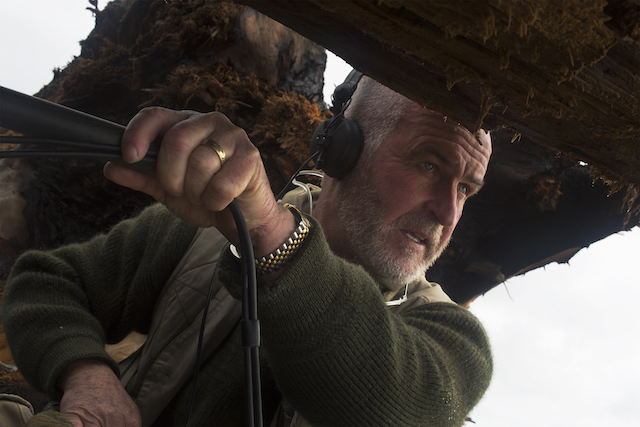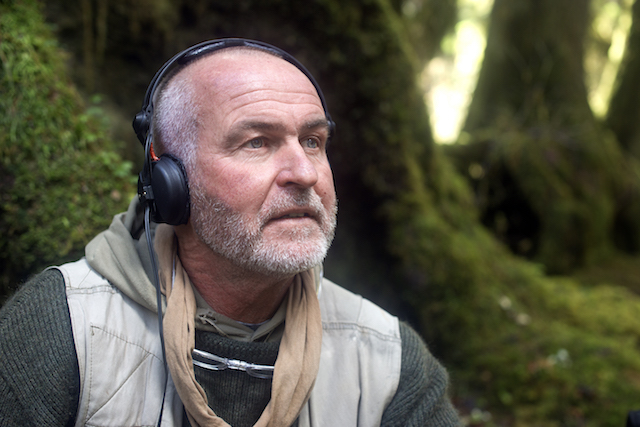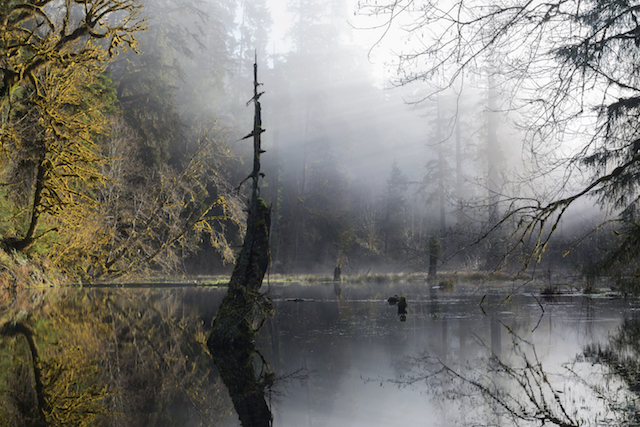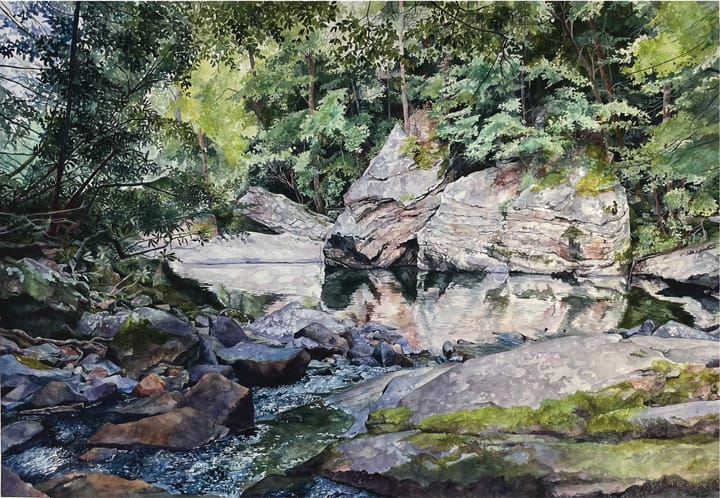The Sound of Silence: Film 'Being Hear' Turns Up the Volume of Nature

When it comes to preserving nature, the United States is in a scary place right now. However, the continuous work of world-renowned sound recordist and acoustic ecologist, Gordon Hempton has inspired two filmmakers to head into Olympic National Park, appreciate silence and ask themselves—and everyone who watches the 'Being Hear' film—what purpose does nature serve?
This is the time to be alive. This is when we will make the big decision. Will we, or will we not fall back in love with planet earth.
Emmy-award winner Gordon Hempton has spent the last three decades traveling around the world, searching and advocating for silence—not the absence of sound, but the absence of human caused noise. His life’s work has appeared in films, soundtracks and video games, but has transcended far beyond that, touching and inspiring many to recognize his 'silence activism' through a film called 'Being Hear'.
Without hesitation, two friends and filmmakers, Palmer Morse and Matthew Mikkelsen knew: "We’ve got to make a film about this guy.”
[vimeo 162684861 w=640 h=360]
Being Hear: Teaser from Palmer Morse on Vimeo.
Palmer and Matthew met during their time studying film, Palmer being interested in cinematography and directing, while Matt being interested in sound. After having heard about Gordon Hempton’s work, Matt was able to spend some time learning from and being mentored by Gordon.
“I remember Matt coming back after spending that time with Gordon and learning about nature’s sounds. These two loves: nature and sound.” Palmer told The Outdoor Journal in an interview. “Fast forward 4 years later and we made the film. We took a trip out together, I got to meet Gordon and spend time with him and in turn, learned a lot from him and that experience.”

It turned out to be an experience that would also touch and resonate with a large audience as Being Hear became Official Selections at Banff Mountain Film Festival, Telluride Film Festival, Big Sky Documentary Film Festival, International Wildlife Film Festival, and many more.
It has also given its viewers something unexpected along the way—not to mention relief from a sentiment and an overused ‘c-word’ that we at The Outdoor Journal have banished from our vocabulary when speaking about nature.
“The Banff Mountain Film Festival is really about action, 'conquering' the highest mountains and doing it faster than anyone else,” says Matt. “People almost took an audible breath when Being Here started to play. It’s not about this 'conquer nature' attitude, it’s really about appreciating our place in nature and how interconnected with it we really are. Being in nature and seeking silence and just being able to sit there by yourself really allows you to ask yourself questions and think in a way that you’re not able to when you go to work and grocery shopping. We keep bringing up this word meditative, but I think it’s really about being able to engage in metacognition and think about the world and what your place is.”
[gallery type="slideshow" size="full" ids="8266,8265,8263,8262"]
While Palmer was going into this concept fresh and without preconceived notions or expectations, Matt was already “biased and loved it.” That’s why he knew that they wouldn't need the type of meticulous planning that normally goes into making documentaries—by simply arriving at Gordon's front door, he was sure they would come away with something powerful.
“He’s very well spoken. We’ve had a lot of people asking, ‘who wrote the piece that he narrated in the film?’, but that’s just how his brain works. That’s how he speaks in everyday life—these beautifully put together thoughts. So I knew that if we went out there and just put a camera in front of him, we would come out with something really, really interesting. And we were lucky that happened.”
The raw clip of Gordon simply sitting in the forest and speaking is nearly 2 hours long. Not exactly easy to condense down into a 10-minute video, both digestible for our fast-paced world and at the same time effective, but they did just that. This while introducing a concept that is rarely on people’s radar—even those actively aware of how we affect our planet.

Speaking on the rarity of our appreciation of sound, Palmer says, “This is just my personal opinion, but when we talk about specifically environmental issues, a lot of the environmental crises that we have, climate change, etc., most of the rhetoric is rooted in what we see and what we deem as ugly, and a lot of the health risks associated with such. Listening, sound and audio, are not discussed. One aspect I would take away from the film is that sound is important. Listening is a really good indicator to figure out if an ecosystem is unhealthy, if an environment is not as it should be. Obviously if you’re going for a hike in Hawaii, it’s beautiful, but then you hear a big highway in the background. You can imagine how that is affecting any species in that area. So although what we see on the surface might seem beautiful and okay, there are a lot more layers and complexity to it.”
Although we're always behind those sweating to keep national parks beautiful, the relevance of sound is something we don't think about enough.
Both Matt and Palmer were pleased to notice that after watching the film, people appeared to really understand and appreciate the importance of sound, “and not only listening as a physical thing, but as a metaphorical thing as well. Gordon says, which is one of my favourite lines in the film: ‘be like the wave, accommodate all things’. And if you think about that phrase, in a few different ways, it really changes how you move about the world."
The real issue is that the option of actually being able to go outside and find places to do so, to just listen, is something we have less and less of.

“The ability to go into nature and listen to those sounds as they appear is disappearing because the level of noise pollution is slowly increasing, due to population density and transportation, etc.,” says Palmer.
Needless to say, Matt agrees:
"We, in the United States, currently have a president who does not care about the environment. I am pretty biased, but every action that our government has taken in the past few months has been anti-preserving of nature. And that is very scary for a lot of us, regardless if you voted for him or not. Public lands are being auctioned off, the EPA is being cut. We are in a very scary place when it comes to preserving nature right now."
Not to mention the most recent events of President Trump pulling out of the Paris Agreement.
“My ultimate question with this film is what are our national parks for? And it’s not a question we can easily answer. I’m a firm believer that the National Parks in the United States are one of the greatest asset we have a country. There is so much natural beauty, and what do these serve? Being Hear is really just trying to get people to ask themselves that question: what are our natural spaces for?”
These extremely important, but difficult questions have continued to trouble, inspire the filmmakers in their future projects. We at The Outdoor Journal have promised to keep our discretion about their next endeavour, but will have updates with their latest plans as soon as possible.
Head to the Being Hear website for more information about the film and how you can see the full feature. For more on Gordon Hempton, visit his website, The Sound Tracker.
Feature image: Olympic National Park, courtesy of Palmer Morse and Matthew Mikkelsen.





Comments ()